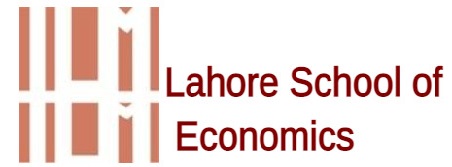MS in Economics
Programme Mission:
The MS program at Lahore School aims to produce intellectuals, researchers and professionals in the field of economics. The course work should provide analytical training to students through seminars, econometrics workshops and advanced level classroom lectures and should match international standards of academics and research. The year-end research projects will be aimed to analyze leading areas of research where students will be required to use econometric techniques and methodology to prepare them for the practical field as well as post-graduate degree (PhD).
The program offers two tracks: MS Economics (1.5 years) and MPhil Economics (2.5 years). The MS Economics track requires 26 credit hours of coursework and an MS Research Project (6 credit hours). The MPhil Economics track requires 32 credit hours of coursework and an MPhil thesis (6 credit hours). Within each track, the program is broad enough to offer four specializations (streams) that are especially designed keeping in view the future placement of the students.
- Quantitative Economics
- Development Economics
- Trade and Public Policy
- Data Analytics
The Quantitative Economics stream offers strong theoretical and quantitative skills to prepare students for PhD programs. The students graduated with this stream are fully prepared to start a PhD in Economics program at any top university. The Development Economics, and Trade and Public Policy streams develop applied skills for professional careers with concentration on Micro-development and Macro-development issues, respectively. The data analytics stream prepares students to analyse economic issues by using advanced data analytic techniques in combination of advanced econometrics and programming skills.
Core courses (Mandatory for all the streams)
- Mathematical Economics
- Econometrics I
- Theories of Economic Growth
- Decision Theory: Producers and Consumers
Brush Up courses (Mandatory for all the streams)
- Calculus and Linear Algebra
- Basic Econometrics
- Stata (Online)
- R Programming (Online)
Note: Brush-up courses 1 and 2 are to be taken on campus in July-August before the main program. Brush-up courses 3 and 4 are to be taken online by students. The graduate program office will facilitate students enrolling in these online courses. Brush-up course 3 to be registered in the Winter term and Brush-up course 4 to be registered in the Spring term.
| First Year | First Year | First Year | First Year |
|---|---|---|---|
| STREAM 1: Quantitative Economics Winter Term: Sept. – Dec |
STREAM 2: Development Economics Winter Term: Sept. – Dec |
STREAM 3: Trade and Public policy Winter Term: Sept. – Dec |
STREAM 4: Data Analytics Winter Term: Sept. – Dec |
|
|
|
|
| Spring Term: Jan. – May | Spring Term: Jan. – May | Spring Term: Jan. – May | Spring Term: Jan. – May |
|
|
|
|
| Summer Term : June. – August | Summer Term : June. – August | Summer Term : June. – August | Summer Term : June. – August |
|
|
|
|
| Second Year Winter Term: Sept. – Dec |
Second Year Winter Term: Sept. – Dec |
Second Year Winter Term: Sept. – Dec |
Second Year Winter Term: Sept. – Dec |
|
|
|
|
| CORE COURSES |
|---|
|
| SPECIALIZATION COURSES |
Quantitative Economics
|
Length of MS in Economics Programme and Graduation Requirements: The MS in Economics Programme is a 1½ to 2-year degree programme requiring completion of 30 credit hours. A CGPA of 2.5 in 24 credit hours of coursework and an MS Research Project or a CGPA of 2.5 in 30 credit hours of coursework is required to graduate from the programme.
Credit Hours and Courses: All courses are three credit hours except the MS Research Project which is 6 credit hours and course indicated as 2 credit hours.
Semester Schedule: The academic year consists of 2 Semesters (Winter and Spring) and a Summer Term. The Winter Semester from September – December and Spring Semester from January - May consist of 16 -18 weeks each including one week for Mid Semester Exams and one week for Final Semester Exams. The Summer Term will be from June – August for 9- 11 weeks.
Entrance Requirements: Admission to the Lahore School’s MS in Economics programme is regulated through (i) HAT 3- Social Sciences/ Lahore School Subject Test for Economics (ii) a Lahore School Admissions Test (iii) previous academic record (iv) an interview process. Candidates with sixteen years of schooling (subject area economics) or 4 years BSc (Hons) Economics graduates with a minimum CGPA of 3.0 and above are eligible to apply for the MS in Economics programme.The application form can be downloaded from this LINK. Submit the application form on an online account at admissions.lahoreschool.edu.pk or through TCS (Courier) at admissions office, 104-C-2. Gulberg III. Lahore
MS without Research Project: Students registered in the MS Economics Programme based on their academic performance, may be given an option with the permission of the Dean of the Faculty to complete two additional courses in lieu of the Research Project.
Transfer to MPhil in Economics Programme: Students registered in the MS Economics Programme based on their academic performance, may be given an option with the permission of the Dean of the Department to transfer to the MPhil Programme at the end of the second semester.
The Lahore School of Economics has the right to make modifications in its Policies including Admission Policies, Fees, Courses, Course Sequence, Seminar, Tutorial and Graduation requirements for any Undergraduate/ Graduate Programme. The School also reserves the right to prescribe pre-requisite course work to a candidate exclusive of regular coursework for the MS/MPhil/PhD Programme
